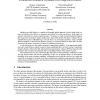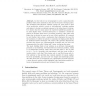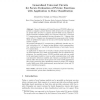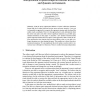26 search results - page 4 / 6 » How much can we trust neural simulation strategies |
ICS
2005
Tsinghua U.
14 years 1 months ago
2005
Tsinghua U.
Traditionally, scheduling in high-end parallel systems focuses on how to minimize the average job waiting time and on how to maximize the overall system utilization. Despite the d...
PODC
2009
ACM
14 years 8 months ago
2009
ACM
Imitating successful behavior is a natural and frequently applied approach to trust in when facing scenarios for which we have little or no experience upon which we can base our d...
CRYPTO
2000
Springer
13 years 12 months ago
2000
Springer
In this work we use cryptography to solve a game-theoretic problem which arises naturally in the area of two party strategic games. The standard game-theoretic solution concept for...
ICISC
2008
13 years 9 months ago
2008
Secure Evaluation of Private Functions (PF-SFE) allows two parties to compute a private function which is known by one party only on private data of both. It is known that PF-SFE c...
ROBOCUP
2001
Springer
13 years 12 months ago
2001
Springer
With the more sophisticated abilities of teams within the simulation league high level online functions become more and more attractive. Last year we proposed an approach to recogn...




